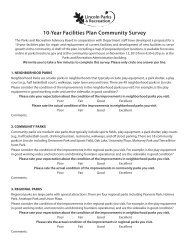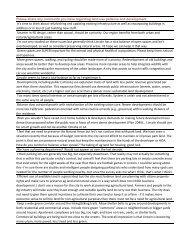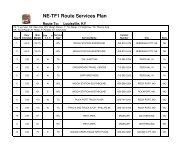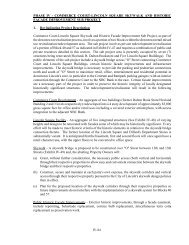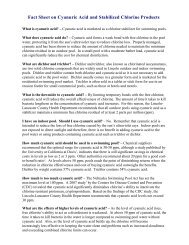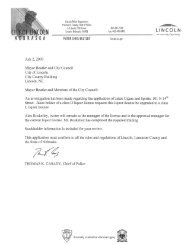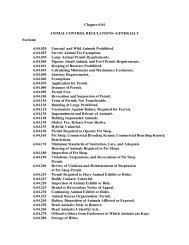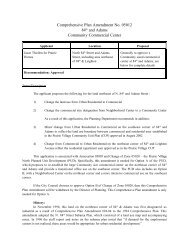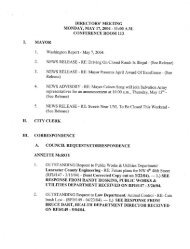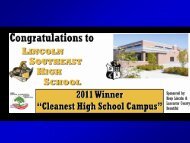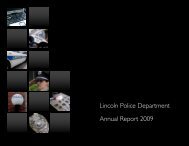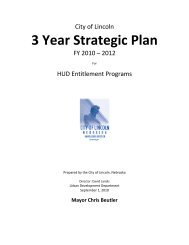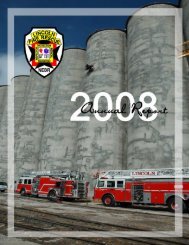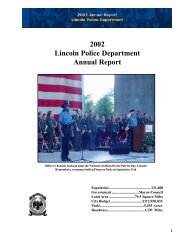fluorescent light tubes - City of Lincoln & Lancaster County
fluorescent light tubes - City of Lincoln & Lancaster County
fluorescent light tubes - City of Lincoln & Lancaster County
Create successful ePaper yourself
Turn your PDF publications into a flip-book with our unique Google optimized e-Paper software.
<strong>Lincoln</strong>-<strong>Lancaster</strong> <strong>County</strong> Health Department<br />
3140 N Street, <strong>Lincoln</strong>, NE 68510-1514<br />
(402) 441-8021<br />
www.lincoln.ne.gov, Keyword: waste<br />
FLUORESCENT LIGHT TUBES<br />
There are currently two types <strong>of</strong> <strong>fluorescent</strong> <strong>tubes</strong> on the market: standard <strong>tubes</strong> and low-mercury <strong>tubes</strong>.<br />
Why are standard <strong>fluorescent</strong> <strong>light</strong> <strong>tubes</strong> a problem?<br />
Standard <strong>fluorescent</strong> <strong>light</strong> <strong>tubes</strong> are not allowed in the <strong>Lincoln</strong> landfill!<br />
Standard <strong>fluorescent</strong> <strong>light</strong> <strong>tubes</strong> contain enough mercury to pose health hazards to humans and animals.<br />
Mercury will evaporate and volatilize in the atmosphere. Breathing air contaminated with mercury can cause nerve damage, liver damage,<br />
blindness and brain damage. Unborn and very young children are at the highest risk.<br />
Mercury can enter drinking water supplies, lakes, rivers and streams, threatening aquatic life, plants, animals and humans.<br />
Mercury has the ability to build up in tissues <strong>of</strong> aquatic organisms to the point that consumption <strong>of</strong> fish is hazardous to birds, mammals,<br />
and humans.<br />
What are low-mercury <strong>fluorescent</strong> <strong>light</strong> <strong>tubes</strong>?<br />
Low-mercury <strong>tubes</strong> contain 40% to 50% less mercury than standard <strong>tubes</strong>. This quantity <strong>of</strong> mercury is<br />
assured by the process used to inject mercury into each tube. This process is an example <strong>of</strong> source<br />
reduction.<br />
Low-mercury <strong>tubes</strong> pass the Toxicity Characteristic Leachate Test (TCLP)—a test that certain wastes must<br />
pass before they can be discarded in a landfill.<br />
Low-mercury <strong>tubes</strong> can be discarded in the <strong>Lincoln</strong> landfill as special waste.<br />
Low-mercury <strong>tubes</strong> are made by various manufacturers. They have green tips or green printing that indicates they are alto or ECO <strong>tubes</strong>.<br />
All mercury <strong>tubes</strong> must be reported on each business’s special waste inventory, even if that business generates less than 43 lbs per month.<br />
Quantities less than 43 lbs <strong>of</strong> low-mercury <strong>tubes</strong> per month may be placed in the landfill without a permit. A permit will be required if<br />
more than 43 lbs <strong>of</strong> low-mercury <strong>tubes</strong> per month are disposed in the landfill. (Forty-three lbs is the equivalent <strong>of</strong> approximately 114 fourfoot<br />
T12 <strong>tubes</strong> per month.)<br />
Contact the <strong>Lincoln</strong>–<strong>Lancaster</strong> <strong>County</strong> Health Department at 441-8021 to obtain a permit for the low-mercury <strong>tubes</strong>.<br />
How does the cost <strong>of</strong> low-mercury <strong>tubes</strong> compare to the cost <strong>of</strong> standard <strong>tubes</strong>?<br />
May 2007<br />
Prices <strong>of</strong> low-mercury <strong>tubes</strong> are approximately the same as standard <strong>tubes</strong>. Check with distributors to compare prices<br />
between each type <strong>of</strong> tube.<br />
The energy requirements are the same for each type <strong>of</strong> tube.<br />
Disposal costs are typically 25 cents per foot for standard <strong>tubes</strong>; this cost and extra handling time can be eliminated by using<br />
low-mercury <strong>tubes</strong>.<br />
Recycling may be more cost effective than paying for a permit if your business generates more than 43 lbs <strong>of</strong><br />
<strong>fluorescent</strong> <strong>tubes</strong> per month.<br />
Where can low-mercury <strong>fluorescent</strong> <strong>light</strong> <strong>tubes</strong> be obtained?<br />
Several local vendors sell low-mercury <strong>tubes</strong> (see the list below). Each vendor usually distributes only Phillips (Alto green tips), General<br />
Electric (Ecolux ECO), or Osram-Sylvania (Ecologic ECO) products.<br />
Check with each vendor to make sure the tube you need is available as a low-mercury product.<br />
The <strong>Lincoln</strong>-<strong>Lancaster</strong> <strong>County</strong> Health Department does not endorse or recommend any specific manufacturer or vendor.
Consolidated Electrical Distributors Crescent Electric Grainger Industrial Supply<br />
2611 Kimco Dr., Suite 1 540 Westgate Boulevard 100 Oak Creek Drive<br />
465-5151 476-2712 476-9014<br />
Husker Electric Supply Voss Lighting Wesco Distribution, Inc.<br />
3450 Cornhusker Highway 5200 South 16 Street 3100 N 33 Street<br />
467-4624 328-2283 467-5311<br />
Where can I take <strong>fluorescent</strong> <strong>light</strong> <strong>tubes</strong> and other mercury waste to be recycled?<br />
Recyclers <strong>of</strong> <strong>fluorescent</strong> <strong>tubes</strong> and other mercury wastes are listed below.<br />
Contact the companies directly for information regarding shipping, containers, or costs.<br />
Each company may <strong>of</strong>fer additional services other than those listed below.<br />
The <strong>Lincoln</strong>–<strong>Lancaster</strong> <strong>County</strong> Health Department does not endorse or recommend any specific vendor.<br />
Company Contact Wastes Collected<br />
A-Tec Recycling Larry Young <strong>light</strong>ing waste, ballasts, and<br />
PO Box 7391 (800) 551-4912 some mercury items<br />
Des Moines, IA 50309<br />
A to Z Recycle Kenneth Babel will not collect<br />
264 Road 1 (402) 563-1048 treated lumber,<br />
Columbus, NE 68601 pigments, spill kits<br />
Mercury Waste Dennis P. all <strong>of</strong> the wastes listed on<br />
Solutions, Inc. McNaughton the right.<br />
2007 West <strong>County</strong> Rd, C-2 (651) 628-9370<br />
Roseville, MN 55113-1211<br />
Midwest Recycling & Curtis Mortrud will also collect transformers,<br />
Mercury Recovery (800) 251-7646 most radioactive waste, coils,<br />
3224 Kingsley Way and capacitors.<br />
Madison, WI 53713<br />
Veolia Environmental Svcs Deanna Chycner all <strong>of</strong> the wastes listed on<br />
1275 Mineral Springs Dr. (800) 831-2852 the right.<br />
Port Washington, WI 53074<br />
Safety Kleen Dean Raven all <strong>of</strong> the wastes listed on<br />
13915 A Plaza (402) 333-6321 the right.<br />
Omaha, NE 68144<br />
Which solid wastes contain Mercury?<br />
Fluorescent <strong>light</strong> <strong>tubes</strong><br />
High intensity discharge (HID) lamps or bulbs<br />
Thermometers<br />
Barometers<br />
Pigments<br />
Dental Amalgams<br />
Special Paper Coatings<br />
Mercury Switches<br />
Filmpack Batteries<br />
Button Batteries<br />
Blood Pressure Gauges<br />
Manometers<br />
Dialysis Pharmaceuticals<br />
Mercury Chlorides<br />
Specific Contaminated Soils<br />
Mercury Spills<br />
Contaminated (used) Spill Kits<br />
Pressure Treated Lumber<br />
Non-PCB and PCB Ballast<br />
Fluorescent <strong>light</strong> <strong>tubes</strong> can also be brought to LLCHD-sponsored Conditionally Exempt Small Quantity Generator (CESQG) Collections.<br />
Watch your mail for announcements <strong>of</strong> events in the spring and fall <strong>of</strong> each year or call 441-8021 for more information.



